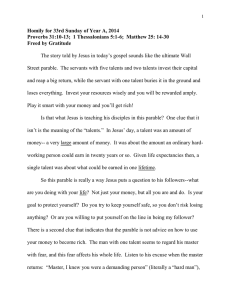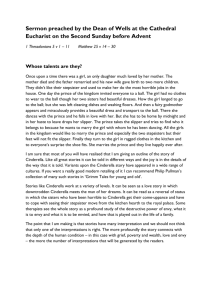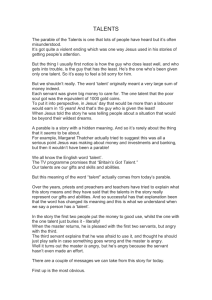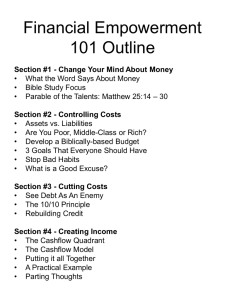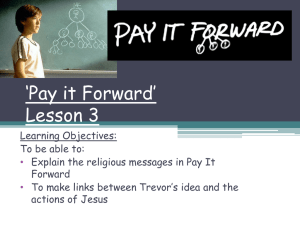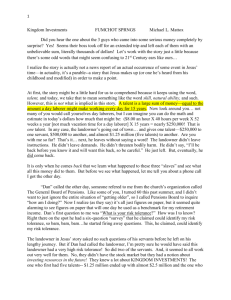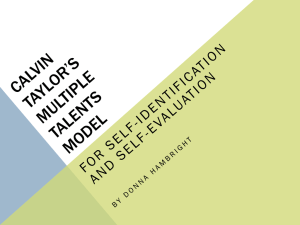15th March 2015
advertisement
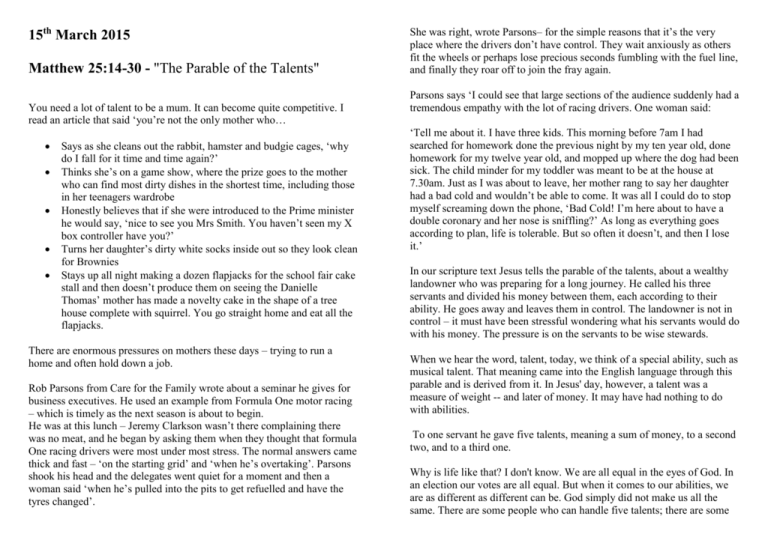
15th March 2015 Matthew 25:14-30 - "The Parable of the Talents" You need a lot of talent to be a mum. It can become quite competitive. I read an article that said ‘you’re not the only mother who… Says as she cleans out the rabbit, hamster and budgie cages, ‘why do I fall for it time and time again?’ Thinks she’s on a game show, where the prize goes to the mother who can find most dirty dishes in the shortest time, including those in her teenagers wardrobe Honestly believes that if she were introduced to the Prime minister he would say, ‘nice to see you Mrs Smith. You haven’t seen my X box controller have you?’ Turns her daughter’s dirty white socks inside out so they look clean for Brownies Stays up all night making a dozen flapjacks for the school fair cake stall and then doesn’t produce them on seeing the Danielle Thomas’ mother has made a novelty cake in the shape of a tree house complete with squirrel. You go straight home and eat all the flapjacks. There are enormous pressures on mothers these days – trying to run a home and often hold down a job. Rob Parsons from Care for the Family wrote about a seminar he gives for business executives. He used an example from Formula One motor racing – which is timely as the next season is about to begin. He was at this lunch – Jeremy Clarkson wasn’t there complaining there was no meat, and he began by asking them when they thought that formula One racing drivers were most under most stress. The normal answers came thick and fast – ‘on the starting grid’ and ‘when he’s overtaking’. Parsons shook his head and the delegates went quiet for a moment and then a woman said ‘when he’s pulled into the pits to get refuelled and have the tyres changed’. She was right, wrote Parsons– for the simple reasons that it’s the very place where the drivers don’t have control. They wait anxiously as others fit the wheels or perhaps lose precious seconds fumbling with the fuel line, and finally they roar off to join the fray again. Parsons says ‘I could see that large sections of the audience suddenly had a tremendous empathy with the lot of racing drivers. One woman said: ‘Tell me about it. I have three kids. This morning before 7am I had searched for homework done the previous night by my ten year old, done homework for my twelve year old, and mopped up where the dog had been sick. The child minder for my toddler was meant to be at the house at 7.30am. Just as I was about to leave, her mother rang to say her daughter had a bad cold and wouldn’t be able to come. It was all I could do to stop myself screaming down the phone, ‘Bad Cold! I’m here about to have a double coronary and her nose is sniffling?’ As long as everything goes according to plan, life is tolerable. But so often it doesn’t, and then I lose it.’ In our scripture text Jesus tells the parable of the talents, about a wealthy landowner who was preparing for a long journey. He called his three servants and divided his money between them, each according to their ability. He goes away and leaves them in control. The landowner is not in control – it must have been stressful wondering what his servants would do with his money. The pressure is on the servants to be wise stewards. When we hear the word, talent, today, we think of a special ability, such as musical talent. That meaning came into the English language through this parable and is derived from it. In Jesus' day, however, a talent was a measure of weight -- and later of money. It may have had nothing to do with abilities. To one servant he gave five talents, meaning a sum of money, to a second two, and to a third one. Why is life like that? I don't know. We are all equal in the eyes of God. In an election our votes are all equal. But when it comes to our abilities, we are as different as different can be. God simply did not make us all the same. There are some people who can handle five talents; there are some who can handle only one. There are some persons who have great intellectual capabilities, and some who do not. There are some who have the ability to project and articulate their thoughts, and there are some who cannot. There are some who have physical prowess and attractive looks, and there are some who do not. something. No one was left idle. You may not be a five-talent person, but you have some talent. We all do. And you know something, I think that there are a whole lot more one and two talent people in this world than there are five talent people. Oh, there are some people who seem to have it all. I won't deny that. But most of us are just one or two talent servants. We cannot all be brain surgeons. The Disneyfication of our culture, dream a dream, become whatever you wish for, reach for the stars, tries on one level to encourage people to be the best they can be and aspire for greatness. But on another level it leads to despair and disillusionment. We can’t all be brain surgeons, concert pianists, premier league footballers, X Factor singers or whatever other dreams school children have. One of the hardest tasks for parents is helping their children be realistic about their ambition and gifts, their personalities and their talents. Maybe those talents are unspectacular talents – humble service. Where would we be without those who did the humble things? We have numerous rotas in this church – opportunities for humble mundane service m- but we wouldn’t operate without them – so please sign up if you can. We especially need people who will help in our hospitality and social events – from setting u rooms to clearing up and cleaning up rooms as well as catering. Simple tasks but someone needs to do them. We send our children into world that will continually judge them. They will be forced to ask themselves: ‘Am I clever enough?’ ‘Am I good with people?’ ‘Am I determined/flexible/ focused/laid back…. Enough? And of course, ‘Am I attractive enough? Matching up to the demands of others is a wearisome business. But we do our children a wonderful service if we send them into that world with an unshakeable belief that there is at least one person, who irrespective of their grades, weight or athletic genius, loves them – anyway. It really is the greatest gift. Most of us adults are still searching for somebody to love us like that. Church can help. Hopefully we run with counter cultural expectations of people. We make space for those who are least advantaged in society. We don’t care whether we are fashionable, or cool or with the in crowd. We are not about winners. Jesus didn’t come for the winners, the ones who had made it or thought they had made it. Our faith tells us that God loved the world. God loves those who no one else loves. Jesus dies on a cross for each one of us. When you come to terms with that truth – it rocks your boat and blows your socks off. And hopefully it gives you a deep deep security as you go into a world that is deeply deeply insecure and competitive. Four things from this parable about life and how we respond to it.: First of all we all have something to offer. The important thing to remember is that each servant was given We all have something to offer. Even when life takes away our talents we will still have something to offer. I heard about an old lady who lived her life for others. When it became necessary for her, in her nineties, to go into a nursing home, she welcomed the opportunity. She said, 'There might be some people there who don't know the Lord and I can read the Bible to them'." Secondly, all that we have is not our own, it belongs to the master. Our society is not only competitive it is also possessive. This is mine, I’ve earnt it, I deserve it. If you caught any of the Comic Relief on Friday you will have been taken to all sorts of places where because of the place where you were born your life chances will vary greatly. Life is unfair and makes us question what do we deserve actually? We are incredibly fortunate to live in this country which should always give us a sense of perspective on these things. We believe in a God of justice who therefore is not happy with the disparity in the world. So it is a great challenge to the followers of Jesus as to how we can respond to the need we see around us both material and spiritual. We are not the owners of the world but the stewards of the world. What we are doing with the earth’s environment and climate is a gospel issue. What we do with our wealth and possessions is a gospel issue. Because all that we have is a gift from God. Let us never forget that. Thank you for those gifts you have given for the work of this church and the gifts you continually give for the work of this church. You are in effect giving back to God something of the gifts that God has given you. I don’t believe God is against wealth – but if you have been blessed you have mnore oppruntiy to bless others. Live life graciously and not possessively – I know it’s hard in our competitive and possessive culture – but we are called to be counter cultural in following the agenda of Jesus not of the world. If there is a God we are held to account . A lot of questions on the Christianity Explored Course have been about this. Some people believe in Christianity as a bit like a heavenly examination. One day God sets the final exam and sees who passes and who fails. At first sight this parable may simply reinforce that impression. But parables don’t tell you the whole picture of God the maker and lover of the world. The whole ministry of Jesus should make us protest against such a view of Christianity. Jesus declared he had come to call, not the righteous but the sinners and to seek and save the lost and warned the religious types against thinking Christianity was about rules to be kept. This parable comes near the end of the story of the gospel when the Son of man came to give his life as a ransom for many – not for the few. When Jesus speaks about being thrown into the darkness outside where there is weeping and the gnashing of teeth, we must never forget that he himself was on the way into the darkness, where even he would sense himself abandoned by God and worthless. We are not our own we are bought with a price – thank God we are His, valued and precious in His sight – greater love hath no one than this that he lay down his life for his friends. You may have been given five talents. Don’t be arrogant and think you are better than the rest. Live in humble gratefulness to God – he has entrusted you with these talents for his service and the good of his world. God is taking a risk – but values you so much he’ll take it with you. You serve a purpose bigger than the enlargement of your own kingdom. The more our political leaders appeal to people’s self interest, the more we are destined for the breakdown of our society. We are not our own. We depend on each other and ultimately we depend on God, to whom we belong. Thirdly, we always have an opportunity to serve the master so long as we can overcome our fear or lethargy. The landowner in this parable went on his journey. When he returned he called together his three servants and asked them to give an account. It seems that the five talent man had invested his talent and was able to return an additional five talents, a 100% return. So, too the two talent man doubles his money. Well done good and faithful servant.” But what about the one talent man? He stepped forward and said: Sir, I knew you to be a hard man, reaping where you did not sow. So he returned that which he had originally been given him. The landowner, incensed, uses words such as “slothful” and “wicked.” Angrily he took the talent back and gave it to the servant who now had ten. Well, it is obvious that the star, or we might say the villain, of the story is the one talent man. The salient question is: why did he choose to do nothing with the one talent that had been given to him? We are not really given the answer. We are left to speculate. Is his inaction due to the fear of failure? Is his inaction because of the ‘What if” game? Is he thinking ‘Will one little talent make a difference – so why bother?’ One of the messages of this parable could be that being taken up in Christ’s service involves more than playing it safe and doing little or nothing. It demands the kind of devoted and risky service to Christ’s kingdom that produces results. Fred Craddock has said: “The major themes of the Christian faith - caring, giving, witnessing, trusting, loving, and hoping - cannot be understood or lived without risk." The third servant was afraid of his master. The parable means to transform our imagination about who God is. If we remain trapped in imagining God as a fearsome God of vengeance, then we end up judged according to our own imaginations. But if we can imagine a gracious God, as perhaps the first two servants do, then both our actions and the consequences of our actions yield gracious results. Actually, the third slave acted as he was probably taught. In first century AD/ Jewish culture taught that if one was entrusted with something of great value, one should bury it in the ground for safekeeping. Some scholars, notably William Herzog, suggest that the third servant is a hero. This servant stood up to a demanding boss who encouraged his employees to increase his wealth and their own bank accounts by making loans or investments that charged exorbitant interest rates. Burying the funds kept them from being used for such corrupt purposes. By refusing to take action that would have oppressed others and shaming the business practices of the owner, the third servant embraces God’s reign of justice and equity. Is the behaviour of the master in the parable something that God would commend, let alone imitate? Do you see God as harsh and demanding? Is this kind of behaviour what Jesus expects of God's people? I hope not! How do you deal with harsh and demanding authority figures? Maybe you had or have a harsh and demanding mother. Let us not be sentimental about parents – parent - child relationships are more often than not complex. Do you respond to the demands by redoubling your efforts to please – like the first two servants – retuning a good profit to keep the ‘boss’ happy. Or do you become subversive and rebellious and stand up against the bullying and the demands – like the third servant. I’m not playing your game – here have the talent back. Parables are deliberately open to many interpretations – that is how the Spirit works – those who have ears to hear listen for what the spirit is saying. Jesus doesn’t add a key to interpreting the parable. He doesn’t make a moral out of it – so it is ambiguous. If we don't read Christ or God as the master anywhere in this parable then we could see this simply as Jesus making a comment on standard human economics for which, "The rich get richer and the poor get poorer" (a defensible interpretation of the master's comment in verse 29). Then kingdom of heaven will be found with those who suffer from such economics. If we "follow Jesus," that's where we will find him, namely, with those left out when the rich get richer. Jesus' life began in a barn, grew up in the poverty of Nazareth, spent a ministry among the poor and outcast, and finally let himself be handed over into the hands of the richest and most powerful of his nation to be judged as one completely on the outside, a godforsaken, blaspheming criminal. Final point of hope is that God looks at the big picture. It is interesting to note that in the 25th chapter of Matthew’s Gospel there are three parables told in a row: The Parable of the Bridesmaid, The Parable of the Sheep and Goats, and the Parable of the Talents. Essentially the same phrase is used in each: after a long time. The bridegroom comes after a long time. The landowner returns after a long time. The judgment comes after a long time. Perhaps this is Matthews’s way of saying to us: Our master may be delayed in his return, but, in the meanwhile, what are you doing with the talent that has been entrusted to you. If things aren’t working out for you now – don’t fret –it’s a long haul. You shouldn’t judge a football team after only a few games. It’s the table at the end of the season that counts (sadly in Burnley’s case) So many people I have come across who didn’t do well at school but found themselves later in life. So many people look back on their lives and remember how they coped with hardship, parenthood, suffering depression, breakups of relationship, but they came through. These things will pass. It’s a long journey – keep going, keep going in faith and hope – God is with you and God is gentler on us than we usually are on ourselves. We all have something to offer. We are not our own Overcome your fear and serve the master Look to the long term.
